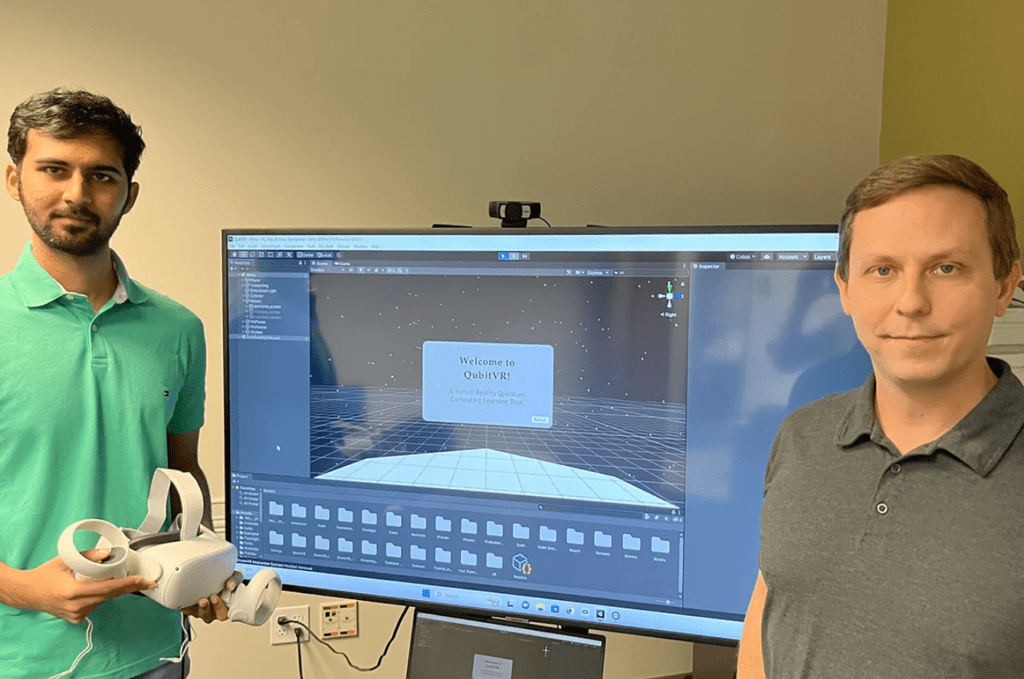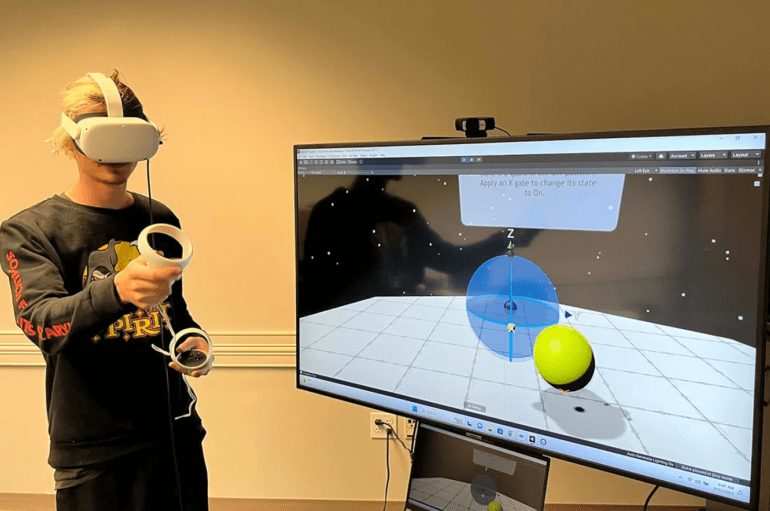TL;DR:
- Collaborative project between UCF, UT Dallas, and Vanderbilt secures a $927,203 NSF grant.
- Aims to enhance quantum education using virtual reality (VR) and machine learning.
- QubitVR, a quantum-education VR application, is at the core of the project.
- The project targets identification and rectification of misconceptions in quantum information science.
- Quantum computing’s potential, challenges, and the need for skilled individuals.
- QubitVR to empower students with visual insights into quantum mechanics.
- The importance of bridging the gap between quantum physics and computer science.
- Quantum computing algorithms’ potential applications.
- VR’s role in breaking down barriers to understanding quantum mechanics.
- Expertise from UCF, UT Dallas, and Vanderbilt in shaping the project.
- QubitVR’s unique opportunity to identify and address students’ misconceptions.
- Project’s potential to make quantum information sciences more accessible.
Main AI News:
In a pioneering initiative at the convergence of cutting-edge technology and education, a collaborative effort between the University of Central Florida (UCF), the University of Texas at Dallas, and Vanderbilt University has secured a substantial three-year grant of $927,203 from the U.S. National Science Foundation. The objective? To advance the landscape of quantum education using the transformative power of virtual reality (VR) and machine learning. This visionary project is set to identify and tackle misconceptions surrounding quantum information science (QIS).
Kicking off in August 2023, this ambitious project is underpinned by the innovative QubitVR application, previously developed by UCF through its computer science senior design program. It represents a significant leap forward in the realm of quantum education, with the potential to redefine how we comprehend the intricate world of quantum mechanics.
QubitVR, the Quantum Education VR Application
At the heart of this endeavor lies QubitVR, a quantum-education VR application poised to reshape the future of quantum education. Utilizing this technology, educators can transcend traditional teaching methods, providing students and professionals with tangible, visual insights into the complex domain of quantum mechanics.
Ryan McMahan, an associate professor of computer science at UCF and the lead principal investigator for the project, highlights the vast potential of quantum computing. He emphasizes how the inherent complexity of the field, rife with misconceptions about concepts like superposition and quantum logic gates, often acts as a formidable barrier to entry.
The Quantum Revolution: From Cryptography to Big Data
Quantum computing, grounded in the principles of quantum mechanics, empowers us to unlock unparalleled processing capabilities. For instance, McMahan points out that quantum computers have the capacity to crack encryption methods that currently safeguard emails and passwords in a matter of minutes. The implications of this newfound power are monumental.
Yet, the shortage of individuals possessing both a solid grasp of quantum mechanics and strong algorithmic skills is a pressing concern. McMahan asserts that training individuals with a profound understanding of quantum mechanics, combined with robust algorithmic backgrounds, is essential for the development of a broader spectrum of quantum computing algorithms. These algorithms hold the key to applications in cryptography, security, big data analysis, and beyond.
A Collaborative Endeavor for Quantum Education
The project’s inception traces back to a conversation between Ryan McMahan and Michael Kolodrubetz, an assistant professor of physics at the University of Texas at Dallas. They envisioned the potential of VR in facilitating education on intricate concepts like quantum mechanics and soon began collaborating on QubitVR.
Kolodrubetz, serving as the quantum expert on the team, leverages his expertise in non-equilibrium quantum mechanical systems and quantum mechanics instruction for non-physicists. His role is pivotal in adapting QubitVR to elucidate the most challenging facets of quantum information science.
Quantum Mechanics in the Digital Age
As technology continually scales down to smaller dimensions, quantum mechanics and quantum information become increasingly relevant to the technological landscape. However, many STEM students receive limited exposure to quantum science, often grappling with misconceptions rooted in their classical physics experiences. QubitVR is poised to break down these barriers by allowing students to interact with quantum systems of technological significance.
Kelley Durkin, a research assistant professor at Vanderbilt University, brings her expertise in studying children’s misconceptions in mathematics to the project. She will serve as the learning scientist, contributing to the development of a new assessment of students’ knowledge of quantum information sciences and identifying and addressing misconceptions in real-time through QubitVR.

UCF Computer Science master’s student Keerthan Reddy Rajulapally and Computer Science associate professor Ryan McMahan will be evaluating QubitVR and intelligent tutoring versions of the VR application through lab-based studies and undergraduate quantum information science courses. Source: University of Central Florida
Conclusion:
The integration of virtual reality and machine learning into quantum education is poised to revolutionize the field. By addressing misconceptions and providing tangible insights, this project has the potential to bridge the gap between quantum physics and computer science. It could lead to the development of a broader range of quantum computing algorithms and applications, making the quantum market more accessible and impactful.

